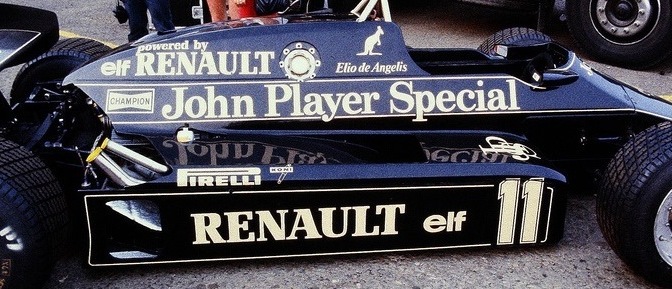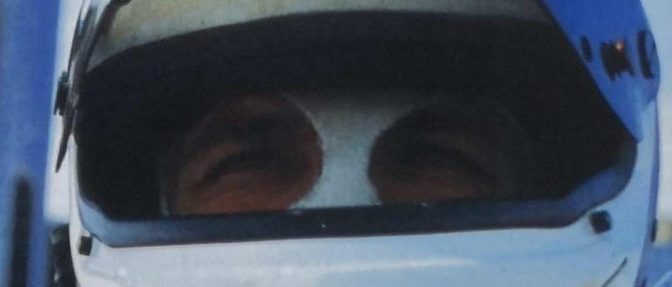L’articolo si riferisce al Gran premio di Gran Bretagna 1983, la corsa che vide la Lotus 94T debuttare con grandi aspettative. La vettura, progettata e costruita in sole cinque settimane, — così si lascia sfuggire Ducarouge — andò incontro a molte noie già nel corso delle prove libere e, dunque, di quelle qualificatorie. Mansell, attardato in griglia di partenza, risolse un problema all’impianto elettrico soltanto grazie al pronto intervento di una piccola impresa fornitrice della Lotus, la quale fece recapitare gli opportuni e desiderati cavi la notte precedente alla gara; de Angelis, subito competitivo, partente quarto dietro a Prost e il più veloce sia nelle prove non cronometrate che la domenica mattina, a mezzogiorno, ebbe riservata sorte amara dopo un nonnulla di tempo dall’inizio della gara: lentamente mossosi dopo il primo assalto all’asfalto, trovatosi settimo dietro a Piquet e superatolo al termine della prima tornata, alla ‘Becketts’ il propulsore Renault diede di fiamma ardente, arrostendosi i turbocompressori. Tre versioni furono concesse circa il triste inconveniente: al momento del ritiro, si pensò al motore guastato; con un’indagine più approfondita, successivamente, si diede la versione del distributore intraversatosi, con nocumento della cinghia di distribuzione, e financo della sincronia del moto degli alberi motore; infine, settimane dopo, si fece avanti la soffiata che Elio avesse, per caso, alla ‘Copse’, toccato qualche levetta nel cruscotto, facendo scaturire fuori un’eccessiva quantità di combustibile. Quanto a Mansell, l’eccezionale corsa, fece sì che la Lotus potesse agganciare, a metà stagione, la Arrows nella classifica costruttori con quattro punti, l’inizio di una agognata risalita. La versione tradotta in lingua italiana, curata dal presente sito, si trova allegata in fondo.

“If Elio’s engine hadn’t blown up on the second lap, he’d have run away. Dammit, Nigel got fourth place with a car that hadn’t done a single straightforward lap in qualifying — and he was nibbling at Tambay at the end. The tyres on his car looked like new at the finish … and Elio had been miles quicker with that compound this morning in the warm-up”. Under his anonymous black shirt and slacks (no tobacco identity here, by agreement), Gérard Ducarouge looked pale and slimmer than we know him. Five weeks of almost inhuman toil had left their inevitable mark on him, but there was no hiding the mixture of pride and disappointment on his face after the finish of the British GP.
Should he have been disappointed when one of his cars had finished fourth, ready (it seemed) to pick off the better of the two Ferraris? Indeed, yes: considering the brilliant impromptu performance of his British team-mate, there was definitely no reason why the unfortunate Elio de Angelis, having started from the second row of the grid, shouldn’t have won convincingly. During qualifying, bugged by an electrical gremlin which two teams of already weary mechanics had chased in vain for two nights and days, Mansell had no option but to stand around idle. It was therefore Elio’s car which had received Ducarouge’s undivided attention. Elio bubbled over with praise for his engineer’s work.
“I was easily the fastest in both of the untimed sessions and the warm-up. It’s incredible when you think that the car’s come straight out of the box: because we were short of time, we haven’t touched any of the settings … rollbars, springs or wings. When I set third fastest time in the first official session on Thursday we didn’t make any changes at all to the car between the two sets of quallies. Normally you make a few tweaks after you’ve used the first set. For us that wasn’t possible, because the car was fitted with brand new brake discs and I was not able to take the car to the limit and find out how it reacted when it was being pushed hard”.
Looking very determined, Elio was surrounded by a crowd of Lotus mechanics whose tired and bloodshot eyes nevertheless showed their delight and enthusiasm. Elio’s own motivation was plainly rekindled, for his association with the team’s new engineer could not have started more auspiciously. It was the transformation of a team which only a bare month ago had seemed to have shed its ability and its motivation. Surely this was one of the most amazing technical turnarounds in the history of our sport.
Continua a leggere Didier Braillon — “Turnaround” — Grand Prix International n.67/1983




